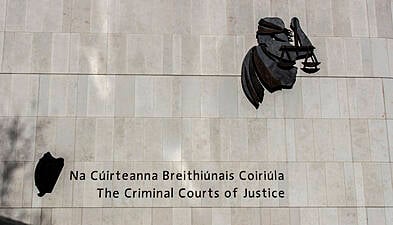"Trouble arrived at the doorstep" of a man who denies murdering his 25-year-old friend after a row over a stolen scooter and, while he may have acted in a primal fashion, he did so to protect his father, his defence barrister has told a Central Criminal Court jury.
Defence counsel Brendan Grehan SC, alongside John Griffin BL, submitted in his closing speech that the case was "as far away as one could get" from a cold-blooded killing and was a reaction by the accused, who had acted in defence of his father.
However, prosecution counsel John Byrne SC asked the jury to consider whether a lesser degree of force from the accused might have been a more measured and appropriate response.
John Titiloye (28), with an address at Mac Uilliam Crescent, Fortunestown, Tallaght, Dublin 24, has pleaded not guilty to murdering Ademola 'Dizzy' Giwa (25) in the Mac Uilliam Road area in Tallaght on August 10th, 2021. Mr Giwa was from Mac Uilliam Parade in the same area.
Addressing the jury on Monday in his closing speech, Mr Grehan said it would not come to them as a huge shock that he would be asking them to acquit Mr Titiloye completely of the offence.
The defence barrister said the State was right in their assertion in their closing speech that his client would like to rewind the clock and not have killed someone he had known from playing football since his early teens.
He said there had never been the slightest argument between Mr Titiloye and Mr Giwa and that there was no reason for the accused to have been in conflict with the deceased.
He added: "We all know why Mr Titiloye was in conflict with him, Samson [Fayemi] had enlisted Ademola by way of some muscle to tackle Mr Titiloye."
The trial heard Samson Fayemi (26) owed a small sum of money to the accused, Mr Titiloye, and that Mr Fayemi's scooter was forcibly taken by a number of men, including Mr Titiloye, "to settle the debt" on August 9th, the day prior to the killing, at Marlfield Estate in Tallaght.
Mr Fayemi and Mr Giwa then called to Mr Titiloye's home at Mac Uilliam Crescent at 6.45pm the following day.
'Spontaneous eruption'
Mr Grehan said the accused did not assert that he was justified in what he did in any shape, manner or form. "This wasn't something planned, he didn't go out looking for trouble, trouble arrived at his doorstep," he continued.
The barrister submitted that this was not a cold-blooded killing but a "spontaneous eruption of matters" in a number of very short seconds.
He said the prosecution had portrayed the altercation as if it was a boxing fight in the National Stadium divided into rounds, "there are no such rules in a street fight".
Mr Grehan told the jurors that things can happen when something occurs in "the heat of the moment".
He asked the jury to consider if his client had acted in the way he did because he believed at that moment in time that he had to act to protect his father. "Witnesses say they heard him say 'daddy' or 'not my daddy' before this happened," he said.
The lawyer said that maybe the accused should have left his father at the scene but submitted that is not human nature. "He may have acted in a primal fashion but in my submission it was an understandable fashion to protect his father," he stressed.
Going through the evidence in the trial, Mr Grehan said the accused's father had proceeded to usher Mr Giwa and Mr Fayemi down the road when there was no sign of anyone "turning on their heels and saying we will sort this out together".
The barrister noted that Mr Fayemi had told the jury in his evidence that he and Mr Giwa had come to the accused's house to invoke some kind of peace process. "That doesn't mean you have to swallow a load of lies, just cause someone is a proven and admitted liar," he said.
He said Mr Giwa or "the man with the muscle" had handed over his car keys to Mr Fayemi before the altercation. "It certainly reminded me of 'hold my jacket, I'm here to do business'," Mr Grehan said.
Drug debt
Mr Grehan said the two men who arrived at the accused's house had no interest in a discussion and were there for one reason only; the humiliation of Mr Fayemi having his scooter taken off him the previous day.
He submitted that everything Mr Fayemi had said in his evidence had to be taken "with a very large grain of salt".
Mr Grehan said Mr Fayemi had testified that the €100 owed to the accused was a drug debt. However, the lawyer said if someone has a drug debt it is not "let slide" for five months and is doubled or quadrupled if one does not pay.
He said Mr Fayemi had made up this story in the witness box to blacken his client's name, "as if he isn't in enough trouble already, simply because Samson knows he took advantage of their friendship, he didn't repay the small debt when he could have".
Counsel said the "massive hole in the prosecution's case" was that Mr Titiloye was walking away from the scene as his father was seen in CCTV footage ushering away the two men. "He [the accused's father] is driving them down the street away, his mother [the accused's mother] is shouting at them to stop, John Titiloye is going back to their home and if Mr Giwa and Mr Fayemi walked away at the moment, you wouldn't be here and either would I," he highlighted.
Furthermore, Mr Grehan told the jury that this was "as far away as one could get" from a cold-blooded event or a murder being committed by masked men. This incident, he said, was a reaction in real time measuring 23 seconds from when the accused bends to pick up a knife when he saw his father in trouble.
Pointing to his chest, the barrister said a person reacts to what is "inside here" and that his client had been acting in defence of his father. "It is literally to protect his father," he said.
Referring to eyewitnesses, counsel said that sometimes they can be incredibly unreliable. "That's when you have a well-meaning witness; when you have a lying mendacious witness they can play holy hell with the truth," he commented. He asked the jury to rely on the CCTV footage which displays how quickly it all happened.
Mr Grehan asked the jury for a verdict in the accused's favour "as that was where all the evidence leads".
Human frailty
In summary, the defence lawyer submitted that murder was not in the case at all on the facts as the defences of self-defence and provocation were present.
The barrister explained that if someone does a provocative act to somebody that causes the person to temporarily lose their self-restraint and complete control that they are not master of their own mind, then in those circumstances the law recognises human frailty. The partial defence can reduce an intentional killing from murder to manslaughter.
Mr Grehan said the ultimate question for the jury was what was on the accused's mind at the time. He said the prosecution was critical that Mr Titiloye had told lies, but counsel submitted that these lies were not of the sort told by Mr Fayemi.
"The bottom line is what were the two men doing outside the accused's house on the night. It's to insult your intelligence that you got an answer from Samson and can act on it," Mr Grehan said, adding that his client had been dragged into something not of his own making.
Counsel asked the jury to bring in a verdict in accordance with the evidence, which he submitted was not "guilty of murder". "It must be something else in terms of the options you have," he said.
In his closing speech, prosecution counsel John Byrne SC said the evidence was that Mr Fayemi's scooter was forcibly taken from him from a group of people including Mr Titiloye at Marlfield estate in Tallaght on the evening of April 9th.
Mr Byrne told the jury it is the prosecution's case that the accused intentionally stabbed Mr Giwa in the neck, intending to kill or cause serious injury to him.
Counsel submitted that it is Mr Titiloye's position that he was in possession of a knife for self-defence and had returned to the altercation to protect or defend his father but that the accused had no recollection of stabbing Mr Giwa in the neck and his only recollection was of throwing a box or a punch. However, the accused accepted he was the only person that could have stabbed the deceased, added counsel.
Deadly violence
For the act of provocation to succeed in the case, the lawyer said the jury had to be satisfied that Mr Titiloye had a sudden loss of self-control upon seeing the fighting between the accused's father and Mr Giwa. Counsel said provocation is not merely a loss of temper but such a complete overwhelming of the accused's constraint that he could not help himself from "inflicting deadly violence".
He said the accused's father had involved himself in the altercation between the accused and Mr Giwa, where the pair exchanged blows and punches to each other. Mr Titiloye could be heard shouting something along the lines of "not my dad" before raising his arm in the air as he moved towards Mr Giwa. He said the entire incident took a matter of seconds before the accused could be seen retreating towards his home.
Mr Byrne said at some point during the altercation with Mr Giwa the accused's father had sustained a stab wound to his eye and had lost sight in the eye. The knife used by the accused was not recovered at the scene or subsequently, he said.
Counsel asked the jury to consider at what point in the altercation did the accused's father sustain a stab injury to his eye, had Mr Titiloye stabbed the deceased at a time when his father was out of harm's way and was the accused justified in his actions in stabbing the deceased in the neck.
He added: "You might consider whether a lesser degree of force might have been a more measured and appropriate response in seeking to defend his father".
The lawyer asked the jurors to look carefully in the CCTV footage at the point where the accused's father and Mr Giwa exchange blows and punches; "who is seen to throw the first punch".
Referring to the accused's interviews, Mr Byrne said that Mr Titiloye had not told gardaí when Mr Giwa was supposed to have removed a knuckle duster from his pocket and put it on. "John Titiloye is the only person in the case who says Mr Giwa was wearing a knuckle duster," he added.

He asked the jury to consider if the accused had given a truthful account of these matters and to juxtapose that with the evidence given by others in the case. "I've no doubt that Mr Titiloye regrets his actions on the day and if he had the option of rewinding the clock he would do that," he said.
The prosecution's contention is that Mr Titiloye stabbed Mr Giwa in the neck and in doing so intended the natural and probable consequences of his actions. "In those circumstances, the prosecution contends he is guilty of murder," he added.
Furthermore, Mr Byrne said there was no legitimate basis for finding that Mr Titiloye's actions were justified and therefore lawful. "There is no basis to return a verdict of not guilty simpliciter," he concluded.
Mr Justice Paul McDermott will complete his charge to the jury of six men and six women on Tuesday before they commence their deliberations.







